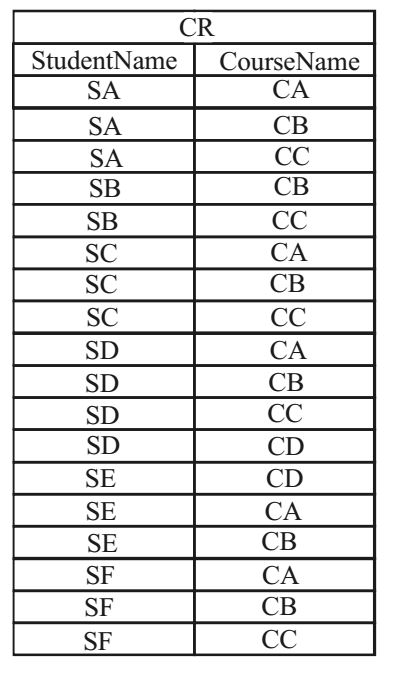Database miscellaneous
- Consider the following database table named water_schemes:

The number of tuples returned by the following SQL query is ________.
with total (name, capacity) as
select district_name, sum (capacity)
from water_schemes
group by district_name
with total_avg (capacity) as
select avg (capacity)
from total
select name
from total, total_avg
where total.capacity ≠ total_avg.capacity
-
View Hint View Answer Discuss in Forum
First we should perform group by group. We get ajmer 1
bikaner 3
charu 2
dungargarh 1
Now we should perform total capacity we will get 100. Now perform avg. capacity on total 100 / 4 = 25. bikaner = 40 which is greater than 25 charu is 30 which is also greater than 25. Hence charu and bikaner will be printed therefore answer is 2 tuples.Correct Option: A
First we should perform group by group. We get ajmer 1
bikaner 3
charu 2
dungargarh 1
Now we should perform total capacity we will get 100. Now perform avg. capacity on total 100 / 4 = 25. bikaner = 40 which is greater than 25 charu is 30 which is also greater than 25. Hence charu and bikaner will be printed therefore answer is 2 tuples.
- Consider a database that has the relation schema CR(StudentName. CourseName). An instance of the schema CR is as given below.

The following query is made on the database.
T1 ← πCourseName (σStudentName= ‘SA’(CR))
T2 ← CR ÷ T1
The number of rows in T2 is _______.
-
View Hint View Answer Discuss in Forum
The given query is made on the database are:
1.
For T1 Result: find out the course name for the student name is ‘SA’ i.e.
So, T1 = {CA, CB, CC} The number of rows in T1 is 3.
2. T1 ← (CR ÷ T1)
For T2 Result: find out the student name for which every course name of T1 are {CA, CB, CC} is:
So, T2 = {SA, SC, SD, SF} Hence, the number of rows in T2 is 4.Correct Option: C
The given query is made on the database are:
1.
For T1 Result: find out the course name for the student name is ‘SA’ i.e.
So, T1 = {CA, CB, CC} The number of rows in T1 is 3.
2. T1 ← (CR ÷ T1)
For T2 Result: find out the student name for which every course name of T1 are {CA, CB, CC} is:
So, T2 = {SA, SC, SD, SF} Hence, the number of rows in T2 is 4.
- Consider a database that has the relation schema EMP (EmpId. EmpName, and DeptName). An instance of the schema EMP and a SQL query on it are given below.

The output of executing the SQL query is_______.
-
View Hint View Answer Discuss in Forum

Result of outer query or Avg (NUM) = 13 = 2.6 5 Correct Option: B

Result of outer query or Avg (NUM) = 13 = 2.6 5
- Given relations r(w, x) and s(y, z), the result of select distinct w, x from r, s is guaranteed to be same as r, provided
-
View Hint View Answer Discuss in Forum
Distinct keyword tells that it will give duplicate entries only once and if r has duplicate entries than it will not show them more than once which tells us that if answer is to be same as r then r should not have any duplicate entries.
Options (c) and (d) are completely wrong but in option (b) its also not necessary that s must also have no duplicate entries thus the answer is option (a).Correct Option: A
Distinct keyword tells that it will give duplicate entries only once and if r has duplicate entries than it will not show them more than once which tells us that if answer is to be same as r then r should not have any duplicate entries.
Options (c) and (d) are completely wrong but in option (b) its also not necessary that s must also have no duplicate entries thus the answer is option (a).
- Let r and s be two relations over the relational schemas R and S respectively, and let A be an attribute in R. Then the relational algebra expression A a (r s) s = >< is always equal to
-
View Hint View Answer Discuss in Forum
Relational schemas R and S A be an attribute in R.
SA=a (r) ⋈ s
The next step is to select A = in relation
Now, since A is attribute of R and r is also a relation of R.
Here write expression is to be performed.
σA=a (r ⋈ s) = σA=a (r ) ⋈ sCorrect Option: C
Relational schemas R and S A be an attribute in R.
SA=a (r) ⋈ s
The next step is to select A = in relation
Now, since A is attribute of R and r is also a relation of R.
Here write expression is to be performed.
σA=a (r ⋈ s) = σA=a (r ) ⋈ s

